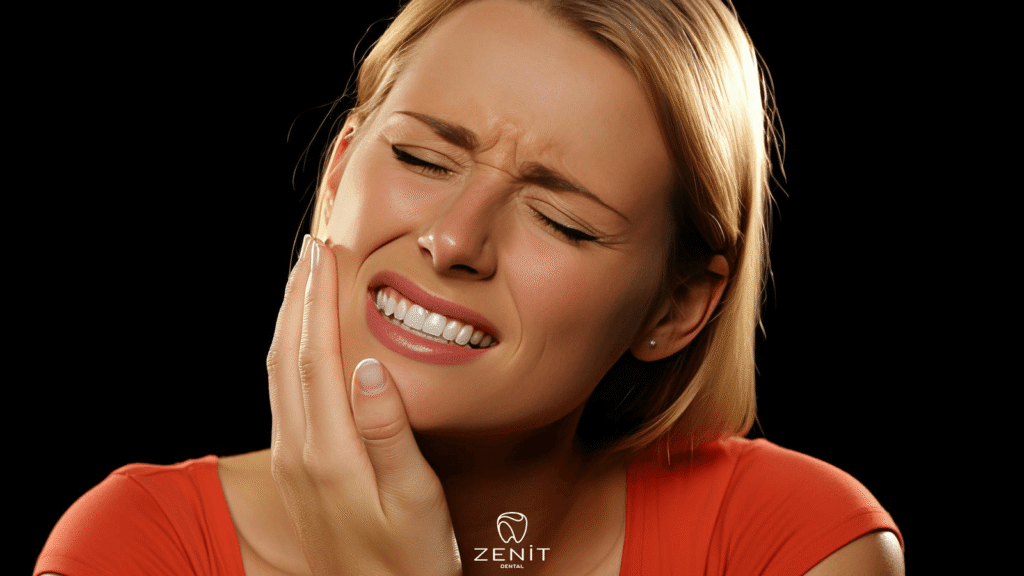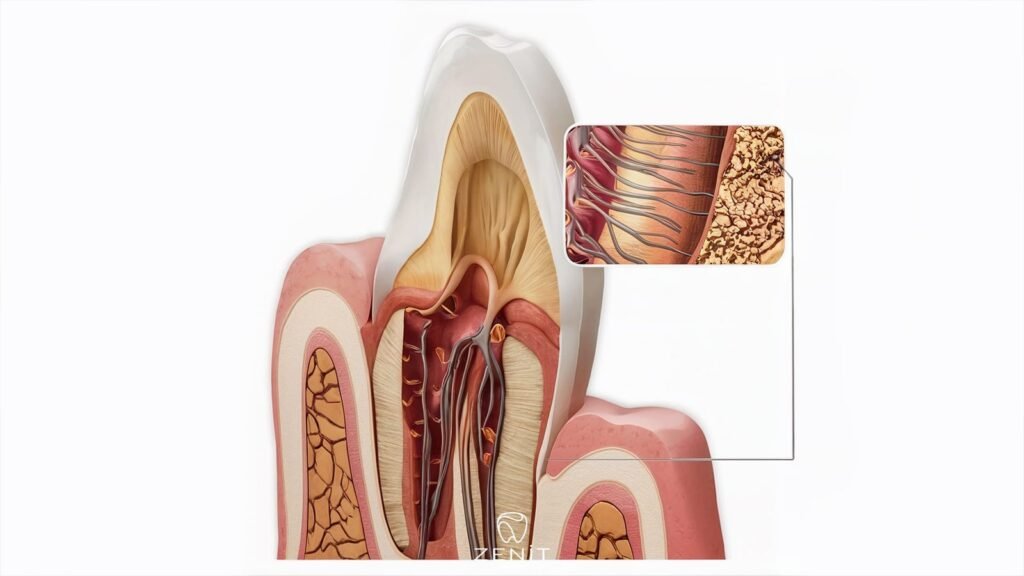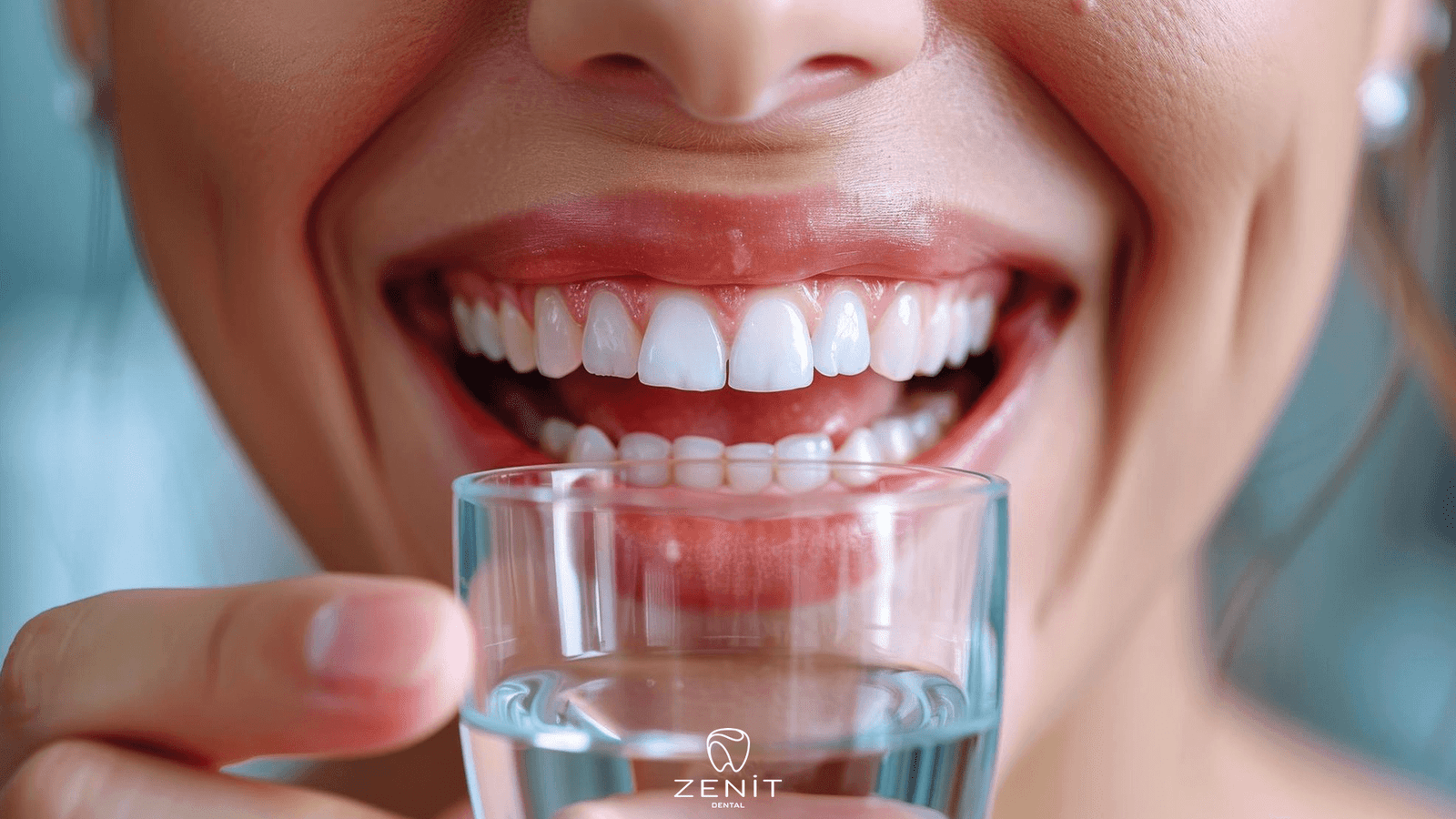What is Dentin Sensitivity?
Dentin sensitivity is a common dental problem that causes sharp and sudden pain in the teeth, especially during consumption of hot, cold, sweet or acidic foods and drinks. This condition can significantly reduce the quality of daily life and even cause you to avoid certain foods and drinks. Dentin is the layer beneath tooth enamel and is full of nerve endings. Conditions such as wear on tooth enamel or receding gums may cause dentin to be exposed, leading to increased sensitivity.
Dentin sensitivity is characterized by pain that usually occurs suddenly and is manifested by certain triggers. These triggers can include hot and cold drinks, sweet or acidic foods, and even cold weather. The severity of sensitivity can vary from person to person, and sometimes even simple daily activities such as brushing your teeth can cause pain. Common causes of sensitivity include excessive tooth brushing, gum disease, teeth grinding (bruxism), and frequent consumption of acidic foods and drinks.
What Causes Dentin Sensitivity?
- Gum Recession: Gum recession can expose the tooth roots, causing the dentin layer to be exposed. This condition usually occurs as a result of gum disease, poor oral hygiene or genetic predisposition. Gum recession causes the nerve endings in the root areas of the teeth to come into direct contact, which can cause sensitivity to hot, cold, sweet and acidic foods and drinks. Additionally, receding gums may cause aesthetic and functional problems in the teeth.
- Tooth Decay: Cavities can cause damage to tooth enamel and expose dentin. Tooth decay begins with the erosion of tooth enamel and the formation of cavities as a result of acid production by bacteria in the mouth. Over time, the progression of caries can cause the dentin layer to become exposed and sensitivity to increase. As decay progresses, symptoms such as pain, discomfort and sensitivity may occur in the teeth.
- Abrasive Tooth Brushing: Brushing teeth too hard or using abrasive toothpastes can wear away tooth enamel and expose dentin. Hard toothbrushes and abrasive toothpastes can cause tooth enamel to weaken and wear away over time. This can lead to exposure of the dentin layer and increased sensitivity of the teeth. Using soft-bristled toothbrushes and low-abrasive toothpastes can help prevent this problem.
- Teeth Grinding: Clenching or grinding your teeth overnight can cause tooth enamel wear and dentin sensitivity. This habit may occur due to stress, anxiety or sleep disorders and can lead to problems such as wear, cracking and sensitivity in teeth. People who have teeth grinding problems can usually manage this problem by taking protective measures such as night guards with the recommendation of their dentist.
- Acidic Foods and Drinks: Foods and drinks with high acid content can erode tooth enamel, exposing the dentin layer. Acidic drinks (e.g., fruit juices, sodas) and acidic foods (e.g., citrus fruits, pickles) can erode tooth enamel and increase sensitivity. Brushing your teeth thoroughly and rinsing with water after consuming acidic foods and beverages can help reduce this sensitivity.
- Dental Treatments: Temporary dentin sensitivity may be experienced after some dental treatments such as dental fillings, root canal treatments or teeth whitening. Procedures such as teeth whitening, in particular, can cause tooth enamel to become temporarily sensitive. The sensitivity that may occur in the teeth after such treatments is usually temporary and can be managed with the care and treatment methods recommended by your dentist.

Symptoms of Dentin Sensitivity
The most obvious and common symptom of dentin sensitivity is a sharp pain in the teeth during consumption of hot, cold, sweet or acidic foods and drinks. These types of foods and drinks can directly affect the nerve endings in the dentin layer, causing sudden and sharp pain. This pain is usually short-lived and passes quickly when the trigger disappears.
A similar sensitivity may be experienced when breathing cold air; Cold weather can directly affect your teeth, causing pain. Additionally, sensitivity may be felt while brushing or flossing. In this case, it is important to brush your teeth gently and use dental floss with the correct technique when brushing your teeth.
Sensitivity may sometimes occur when pressing on the teeth or during chewing movements. Feeling pain, especially when eating hard foods or chewing, is another indicator of dentin sensitivity. Additionally, changes or disorders in the teeth may be a sign of conditions such as erosion of tooth enamel or receding gums.
How to Treat Dentin Sensitivity
- Desensitizing Toothpastes: These toothpastes reduce the stimulation of nerve endings by blocking the dentinal tubules. Regular use can relieve sensitivity.
- Fluoride Treatments: Fluoride gels or varnishes applied by dentists can strengthen tooth enamel and reduce sensitivity.
Toothpaste and Brushing Technique: Using non-abrasive toothpastes and brushing gently with a soft-bristled toothbrush can help protect tooth enamel. - Dentist Interventions: Dentists can close the dentinal tubules by applying special filling materials to sensitive teeth. Additionally, gum grafts can be performed in case of gum recession.
- Adjusting Nutritional Habits: Reducing the consumption of acidic foods and beverages can help protect tooth enamel. Additionally, rinsing your mouth with water after meals can reduce the effects of acids.
- Night Plates: For those who have teeth grinding problems, night plates can reduce sensitivity by preventing the wear of tooth enamel.

How to Prevent Dentin Sensitivity
The most effective way to prevent dentin sensitivity is to establish a good oral hygiene routine. Here are some suggestions:
- Regular Brushing and Flossing: Brush your teeth with fluoride toothpaste at least twice a day and floss daily.
- Balanced Nutrition: Avoid acidic foods and drinks and take care of a healthy diet.
- Dentist Check-ups: Regular dentist check-ups help detect and treat early dental problems.
- Correct Brushing Technique: Brush your teeth gently and with the correct technique. Prefer to use a soft-bristled toothbrush.

Comments are closed